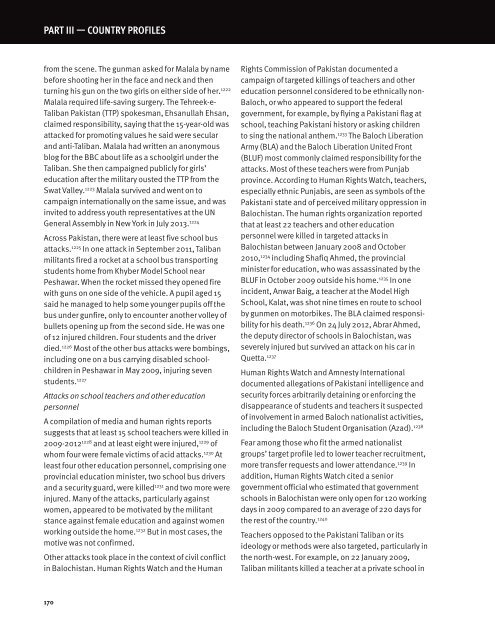Create successful ePaper yourself
Turn your PDF publications into a flip-book with our unique Google optimized e-Paper software.
PART III — COUNTRY PROFILeS<br />
from the scene. The gunman asked for Malala by name<br />
before shooting her in the face and neck and then<br />
turning his gun on the two girls on either side of her. 1222<br />
Malala required life-saving surgery. The Tehreek-e-<br />
Taliban Pakistan (TTP) spokesman, Ehsanullah Ehsan,<br />
claimed responsibility, saying that the 15-year-old was<br />
attacked for promoting values he said were secular<br />
and anti-Taliban. Malala had written an anonymous<br />
blog for the BBC about life as a schoolgirl under the<br />
Taliban. She then campaigned publicly for girls’<br />
education after the military ousted the TTP from the<br />
Swat Valley. 1223 Malala survived and went on to<br />
campaign internationally on the same issue, and was<br />
invited to address youth representatives at the UN<br />
General Assembly in New York in July 2013. 1224<br />
Across Pakistan, there were at least five school bus<br />
attacks. 1225 In one attack in September 2011, Taliban<br />
militants fired a rocket at a school bus transporting<br />
students home from Khyber Model School near<br />
Peshawar. When the rocket missed they opened fire<br />
with guns on one side of the vehicle. A pupil aged 15<br />
said he managed to help some younger pupils off the<br />
bus under gunfire, only to encounter another volley of<br />
bullets opening up from the second side. He was one<br />
of 12 injured children. Four students and the driver<br />
died. 1226 Most of the other bus attacks were bombings,<br />
including one on a bus carrying disabled schoolchildren<br />
in Peshawar in May 2009, injuring seven<br />
students. 1227<br />
Attacks on school teachers and other education<br />
personnel<br />
A compilation of media and human rights reports<br />
suggests that at least 15 school teachers were killed in<br />
2009-2012 1228 and at least eight were injured, 1229 of<br />
whom four were female victims of acid attacks. 1230 At<br />
least four other education personnel, comprising one<br />
provincial education minister, two school bus drivers<br />
and a security guard, were killed 1231 and two more were<br />
injured. Many of the attacks, particularly against<br />
women, appeared to be motivated by the militant<br />
stance against female education and against women<br />
working outside the home. 1232 But in most cases, the<br />
motive was not confirmed.<br />
Other attacks took place in the context of civil conflict<br />
in Balochistan. Human Rights Watch and the Human<br />
Rights Commission of Pakistan documented a<br />
campaign of targeted killings of teachers and other<br />
education personnel considered to be ethnically non-<br />
Baloch, or who appeared to support the federal<br />
government, for example, by flying a Pakistani flag at<br />
school, teaching Pakistani history or asking children<br />
to sing the national anthem. 1233 The Baloch Liberation<br />
Army (BLA) and the Baloch Liberation United Front<br />
(BLUF) most commonly claimed responsibility for the<br />
attacks. Most of these teachers were from Punjab<br />
province. According to Human Rights Watch, teachers,<br />
especially ethnic Punjabis, are seen as symbols of the<br />
Pakistani state and of perceived military oppression in<br />
Balochistan. The human rights organization reported<br />
that at least 22 teachers and other education<br />
personnel were killed in targeted attacks in<br />
Balochistan between January 2008 and October<br />
2010, 1234 including Shafiq Ahmed, the provincial<br />
minister for education, who was assassinated by the<br />
BLUF in October 2009 outside his home. 1235 In one<br />
incident, Anwar Baig, a teacher at the Model High<br />
School, Kalat, was shot nine times en route to school<br />
by gunmen on motorbikes. The BLA claimed responsibility<br />
for his death. 1236 On 24 July 2012, Abrar Ahmed,<br />
the deputy director of schools in Balochistan, was<br />
severely injured but survived an attack on his car in<br />
Quetta. 1237<br />
Human Rights Watch and Amnesty International<br />
documented allegations of Pakistani intelligence and<br />
security forces arbitrarily detaining or enforcing the<br />
disappearance of students and teachers it suspected<br />
of involvement in armed Baloch nationalist activities,<br />
including the Baloch Student Organisation (Azad). 1238<br />
Fear among those who fit the armed nationalist<br />
groups’ target profile led to lower teacher recruitment,<br />
more transfer requests and lower attendance. 1239 In<br />
addition, Human Rights Watch cited a senior<br />
government official who estimated that government<br />
schools in Balochistan were only open for 120 working<br />
days in 2009 compared to an average of 220 days for<br />
the rest of the country. 1240<br />
Teachers opposed to the Pakistani Taliban or its<br />
ideology or methods were also targeted, particularly in<br />
the north-west. For example, on 22 January 2009,<br />
Taliban militants killed a teacher at a private school in<br />
170


